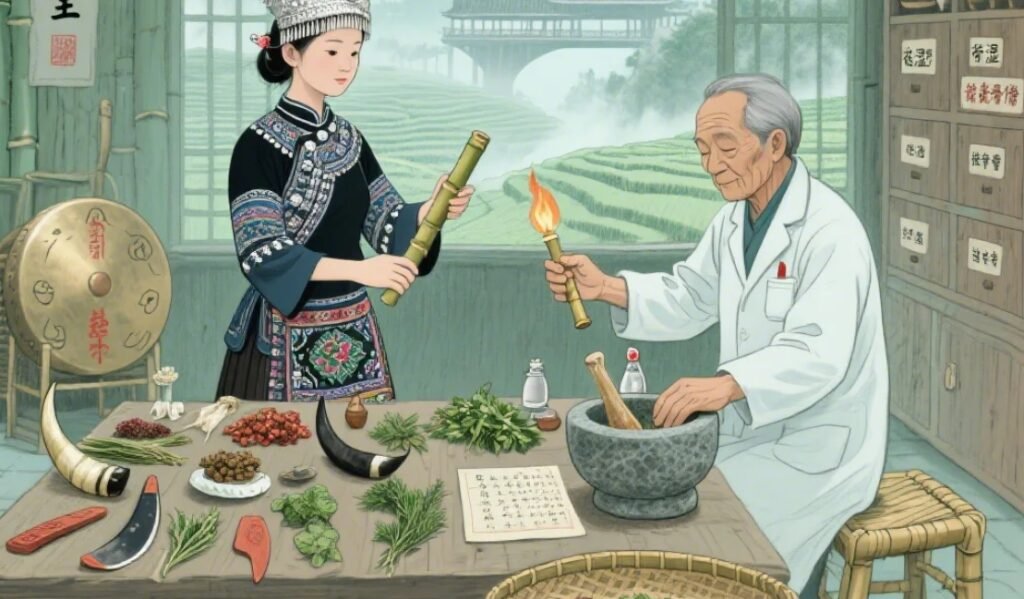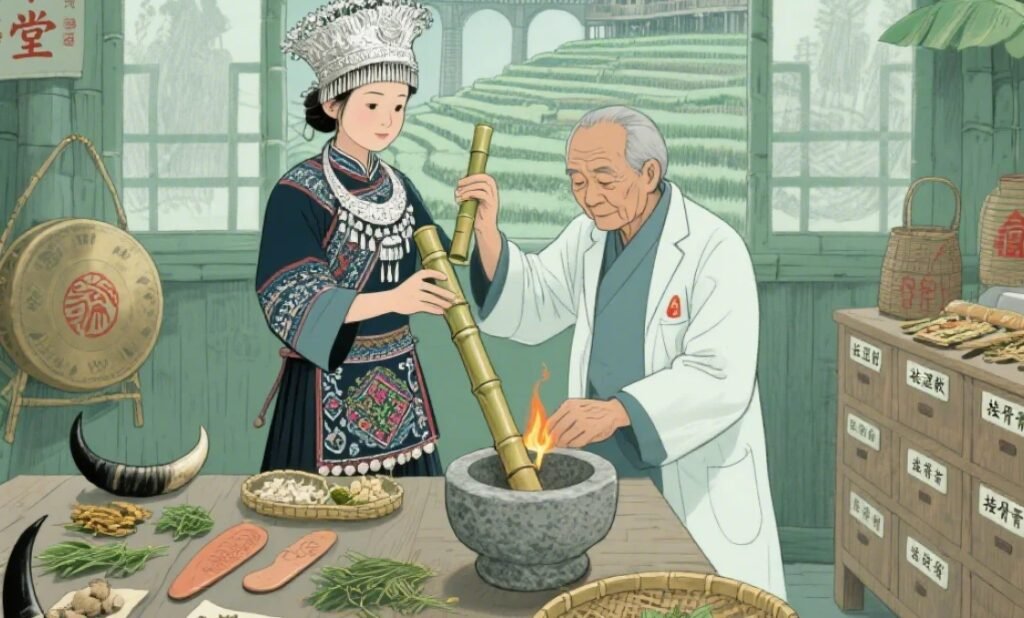Mongb Gek Gangb (Heart Obstruction)
[Overview]
Miao medicine classifies “Mongb Gek Gangb” under heart obstruction. This condition arises when external toxins damage the body’s qi and blood, blocking the vessels and causing stagnation of qi, which leads to chest pain and palpitations. In Traditional Chinese Medicine, heart obstruction (xin bi) refers to the invasion of pathogenic factors—such as wind, cold, dampness, or heat—that block meridians and lodge in the heart. Over time, this harms the heart’s vessels and disrupts normal function, presenting as chest tightness, shortness of breath, and palpitations. In Western medicine, approaches to rheumatic heart disease can be referenced when diagnosing and treating this syndrome.
[Symptoms in Miao Medicine] Miao practitioners consider Mongb Gek Gangb a mild disorder, divided into two patterns: hot-meridian heart obstruction and cold-meridian heart obstruction.
[Causes] According to Miao theory, external pathogens and poor diet can trigger this condition. It most often affects middle-aged and elderly individuals, whose weakened constitutions are more vulnerable to pathogenic invasion and chronic illness.
[Pathogenesis] External wind, heat, cold, or smoke toxins invade the body, causing blood vessel blockage and impaired qi flow. When these toxins attack the lungs, qi and blood become unbalanced, lung qi stagnates, and over time patients develop chest tightness, palpitations, and chest pain.
[Diagnosis]
Clinical Features
The key signs are chest pain, chest tightness, shortness of breath, and palpitations.
Exclude other causes of chest pain, such as trauma.
Examinations
Electrocardiogram (ECG) and chest X‑ray can be used for initial screening.
[Differential Diagnosis]
Mongb Hsongd Dang (Flank Pain) Both flank pain and Mongb Gek Gangb cause pain in the chest region. In Miao medicine, Mongb Hsongd Dang can result from a weak constitution or emotional imbalance damaging the meridians; an irregular diet harming the stomach and intestines and generating damp-heat; or accidental injury causing qi stagnation and blood stasis, leading to one-sided or bilateral flank pain. By contrast, Mongb Gek Gangb arises from toxic invasion of qi and blood, blocking vessels and causing stagnation, leading specifically to chest pain and palpitations.
Mongb Buk Dux (Stomach Pain) Both stomach pain and Mongb Gek Gangb manifest as discomfort in the chest and upper abdomen. Mongb Buk Dux is localized to the upper abdomen and presents as stabbing, distending, or dull pain, often accompanied by poor appetite, nausea, vomiting, belching, and acid regurgitation. Mongb Gek Gangb, however, stems from toxins injuring qi and blood, obstructing vessels, causing chest distension, stabbing or dull pain, and palpitations.

[Treatment Based on Syndrome Differentiation]
Clinical Manifestation: Chest pain—whether distending, stabbing, or dull—that worsens with breathing.
Meridian Pattern: Acute phase corresponds to a hot-meridian heat pattern; chronic phase to a cold-meridian cold pattern.
Treatment Principles: Unblock the meridians , regulate qi, and relieve pain.
Formula and Explanation:
• Wu Xiang Xue Teng (Five‑Fragrance Sargentodoxa, 15 g)
• Ku Dong Zi (Picrasma Bark, 10 g)
• Xiang Fu (Cyperus Rhizome, 10 g)
• Wu Zhu Yu (Evodia Fruit, 6 g)
Decoction taken twice daily.
Herbal Actions:
Wu Xiang Xue Teng: Cold and bitter; enters the heat meridians; moves qi to stop pain, unblocks channels, expels wind, invigorates blood, and reduces swelling.
Ku Dong Zi: Cold and bitter, slightly toxic; enters the heat meridians; regulates qi and relieves pain.
Xiang Fu: Warm and pungent; enters the cold meridians; regulates qi, relieves pain, and smooths the liver.
Wu Zhu Yu: Warm and acrid; enters the cold meridians; warms the middle burner, disperses cold, and dries dampness.
[Preventive Care]
Identify and avoid triggers of heart obstruction as the primary preventive measure.
Protect against wind and cold; maintain appropriate warmth.
Adopt a balanced diet; avoid smoking and alcohol; choose nourishing, easily digestible foods that do not harm the spleen or stomach.
Maintain regular sleep and activity patterns; balance work and rest; moderate sexual activity.
Manage emotions; minimize stress and worry.
[Commentary] Miao medicine teaches that heart obstruction is primarily caused by external factors. The saying “qi and blood rely on each other—qi propels blood, and blood carries qi” underscores their interdependence. When qi and blood fall out of balance over time, disease ensues. In Mongb Gek Gangb, external toxins invade, block vessels, and impair qi flow, disrupting the qi–blood relationship. Treatment focuses on invigorating blood, unblocking channels, and relieving pain.



Leave a Reply